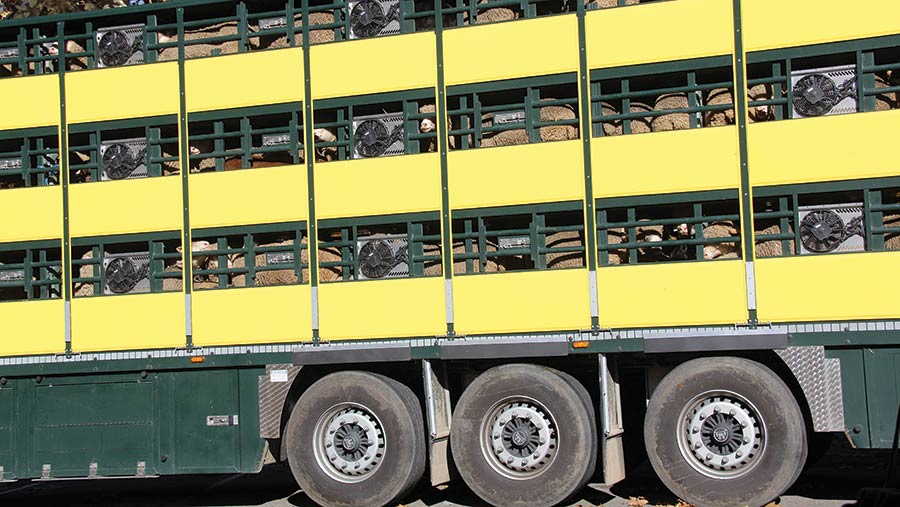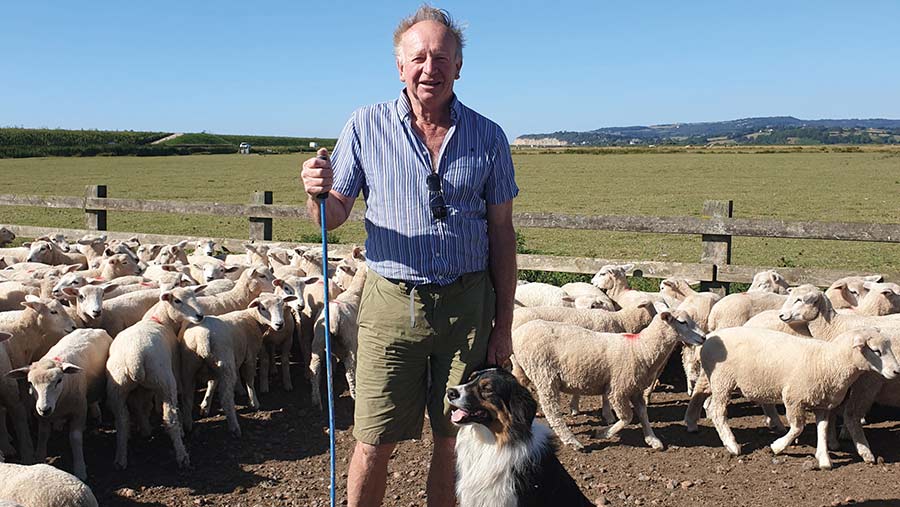Analysis: What a live exports ban means for farmers
 © helenedevun/Adobe Stock
© helenedevun/Adobe Stock A ban on the live export of animals for slaughter and fattening from Great Britain could be introduced in just a few months as part of a manifesto commitment by the Conservative government to improve animal welfare standards.
The Animal Welfare (Live Exports) Bill will prohibit the export of certain live farm animals for slaughter and further fattening from England, Scotland and Wales, to destinations outside the British Isles.
The bill will end the long-standing trade in sheep and lambs for slaughter and fattening, and calves to continental veal farms. It will also apply to goats, pigs, wild boar and horses.
See also: Bill to ban live animal exports heads for the Lords
But it will not affect the movement of animals for breeding or competition, provided they are transported in line with legal requirements aimed at protecting their welfare.
Importantly, the bill will not apply to Northern Ireland, as the terms of the Windsor Framework/Northern Ireland Protocol allows live animals to move freely between Ireland and Northern Ireland.
The bill received all-party support in the House of Commons, where it completed its passage unamended. It was introduced to the House of Lords on 16 January for further scrutiny.
Once the bill has completed its parliamentary stages, it will receive Royal Assent and so become law.
The outcome of the next general election is unlikely to prompt a change of direction, and rapid implementation of the legislation is expected.
Compassion in World Farming reaction
Animal welfare organisations have welcomed the bill, saying it will end the decades-long practice of long journeys which can cause suffering, injury and distress to animals.
Philip Lymbery is chief executive of Compassion in World Farming (CIWF), a farm animal welfare charity which has been campaigning for a ban for decades, arguing that live exports have always played a minor role in the overall meat trade in and from Britain.
He says that in 1990, at its height, about two million live sheep and lambs were exported, representing only about 10% of the entire sheepmeat trade.
But livestock exports have been falling in recent years, “from a tidal wave to a trickle”.
In fact, because border control facilities necessary for post-Brexit exports are not in place, there have been no live exports for slaughter and fattening from Britain since December 2020.
“The bill will enshrine the status quo and therefore will have a neutral economic effect on the farming industry,” Mr Lymbery says.
“In my view, it will benefit the reputation of British farmers by removing a long-standing blight on the otherwise proud practices of the British farming industry in the eyes of many citizens.”
Mr Lymbery says sea crossings across the English Channel often make up just a small element of overall journey times.
In the past, journeys may have taken up to 60 hours, for example starting in Scotland before reaching the slaughterhouse or destination farm as far away as Spain or Italy.
He emphasises the welfare risks for animals of long journeys, including overcrowding, exhaustion, hunger and dehydration, stress, delayed journeys and possible deaths from fire or drowning at sea.
Mr Lymbery says trade in live exports is “totally unnecessary”, adding that all animals reared in Britain for slaughter or fattening should be slaughtered here and their meat then exported.
NFU stance
The NFU says it always wants to see the highest animal welfare standards possible, but it fears the government’s ban on live exports will be counterproductive.
NFU chief livestock adviser John Royle says political pressure from NGOs to ban live exports has been building for the past 20 years or so, so he is not surprised by the government’s decision.
Farmers who once sent regular loads of store sheep to the Continent for fattening will see this valuable market shut down, he says.
This supply, for which there is still demand from farmers in France, Belgium and the Netherlands, will come from eastern Europe over far greater distances.
This is an unintended consequence of Britain’s live export ban which risks worse outcomes for animal welfare.
Mr Royle accepts that journey times in the past were sometimes too long, but maintains that concerns about animal welfare of animals for live exports have been “overplayed” by animal rights groups.
In the past few years, the NFU drew up plans for an assurance scheme to protect the welfare of live animals destined for export to ensure shorter journey times, no onward journeys and quicker processing – but the government rejected the proposal.
Mr Royle says the NFU agrees that slaughtering animals in the UK and sending them on the hook to the Continent is the preferred approach.
For example, it is far more efficient to export lamb carcasses to France in a refrigerated vehicle than sending live animals.
But while the NFU supports the objective of the UK becoming a global leader in animal welfare, it is concerned the bill will put farmers at a competitive disadvantage to counterparts in countries that still allow live exports for slaughter or fattening.
For example, Irish farmers rely on live exports, particularly of dairy calves, and send thousands every year to Spain, France, Belgium and the Netherlands.
Ironically, EU farmers can send their live animals, especially dairy heifers, to the UK with only limited restrictions.
Although exports of breeding animals can continue, Mr Royle points out that volumes have been “decimated” by Brexit red tape.
A lack of border control posts (BCPs) at EU mainland ports is an effective ban on exports of breeding animals.
Irish route required
Currently, because there are no EU BCPs on the short sea crossings to France, Belgium or the Netherlands.
British farmers who want to export breeding animals have to take a route via Northern Ireland to the Republic of Ireland and then on via France to the final destination.
Separately, all export health certificates have been withdrawn because of the bluetongue outbreak, so currently no live exports of any animals are allowed from Britain.
Similar rules apply for EU countries with bluetongue outbreaks such as the Netherlands and Belgium which wish to export stock here.
The National Sheep Association says farmers have faced “severe barriers” with the lack of BCPs for live animal export at Calais, and Defra should “urgently explore ways to overcome the absence of any live animal facility”.
The NFU is in discussions with authorities at the Hook of Holland for exports of high-value breeding animals, including native breeds of cattle and pedigree sheep.
Sussex sheep farmer attacks ‘illogical’ decision

© Frank Langrish
East Sussex sheep farmer Frank Langrish has described the UK government’s decision to ban live exports of animals for slaughter or fattening as “illogical”.
Mr Langrish farms sheep and beef on about 700ha of land at Rye.
He questions why the government has decided to ban live exports for slaughter and fattening when journey times taking stock to abattoirs within the UK are often longer and require fewer checks.
Exported animals have to be inspected by a vet on both sides, regardless of whether they are for breeding, slaughter or fattening.
The vehicles used to carry them are higher standard, with temperature monitoring, force ventilation, defined stocking densities and height requirements.
They can only transport animals within certain temperatures and the drivers must have a qualification in livestock transport.
“The majority of our sheep sold through Ashford Market are killed in North Wales or further afield,” he explains.
“The sheep I take that go to abattoirs in this country do not have to be inspected by a vet. They are just loaded onto a lorry and off they go.”
Previously, Mr Langrish would send sheep from Dover via Calais to an abattoir in Sluis in the southern Netherlands. The total journey time was about five hours.
“The further fattening market was an important one in Europe. It took a lot of our lambs in the autumn to graze on their farms, which helped support our market,” he says.
Mr Langrish says the live export ban will end another potential market for British farmers who are losing their subsidies and need to gain maximum returns from the marketplace.
Because of a lack of border control posts on the EU mainland, British farmers who want to export pedigree stock into Europe are being forced do so via Ireland, he says.
“This is complete and utter nonsense – it takes three days when they could get there in six hours.”
NFU’s key asks for live exports and abattoirs
- Infrastructure and support for border control posts in Europe to allow British farmers to resume and maintain the trade in high value, high welfare breeding animal movements.
- Ensure adequate infrastructure and support for meat processors who are engaged in exporting British product, including support to increase productivity to drive value for the UK livestock industry.
- Greater flexibility in Defra’s fund for small abattoirs to support more medium-sized abattoirs that are focused on meat exports, particularly for the sheep sector.
